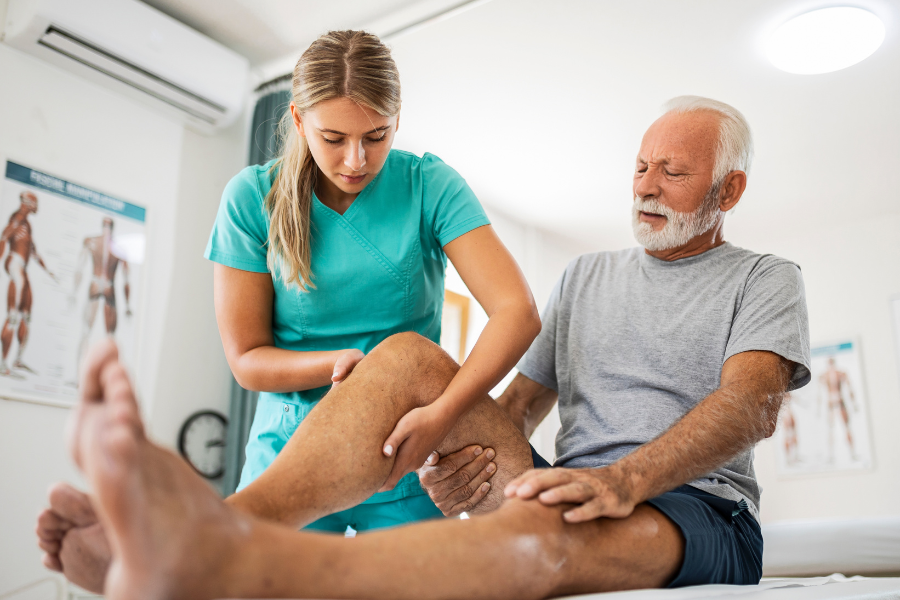 What is a Meniscus Tear?
What is a Meniscus Tear? - Common Symptoms of a Meniscus Tear
- Diagnosis of a Meniscus Tear
- Treatment Options for Meniscus Tears
- Recovery and Rehabilitation After a Meniscus Tear
Meniscus tears are common knee injuries, affecting approximately 12% to 14% of the population. In the U.S. alone, around 1 million people experience this issue annually. At Louisville Hip and Knee Institute, we frequently treat patients with this condition.
Whether you’re an athlete, a weekend warrior, or someone who has experienced a knee injury, understanding how to recognize and address a meniscus tear can significantly impact your recovery. Let’s explore the key aspects of meniscus tears to help you make informed decisions about your knee health.
What is a Meniscus Tear?
A meniscus tear is a knee injury that affects the cartilage of your knee. The meniscus is a C-shaped piece of cartilage in your knee that acts as a shock absorber. It helps distribute weight evenly across the joint and facilitates smooth movement. When this cartilage tears, it can lead to pain, swelling, and difficulty moving your knee.
Common Symptoms of a Meniscus Tear
If you suspect a meniscus tear, you may experience the following symptoms:
- Pain: Often felt on the inner or outer side of the knee.
- Swelling: Accumulation of fluid around the knee joint.
- Stiffness: Difficulty bending or straightening the knee.
- Popping sensation: A distinct sound or feeling at the time of injury.
- Locking or catching: The knee may feel stuck in one position.
- Giving way: A sudden feeling of instability in the knee.
Diagnosis of a Meniscus Tear
To accurately diagnose a meniscus tear, your orthopaedic specialist at Louisville Knee and Hip Institute will conduct a thorough physical examination. Your doctor may also recommend imaging tests such as:
- X-rays: To rule out other conditions like arthritis.
- MRI: Provides detailed images of the meniscus and surrounding tissues.
Treatment Options for Meniscus Tears
 The treatment approach for a meniscus tear depends on several factors, including the location and severity of the tear, your age, and overall activity level.
The treatment approach for a meniscus tear depends on several factors, including the location and severity of the tear, your age, and overall activity level.
Non-surgical Treatment
Many meniscus tears can be effectively managed without surgery. Initial treatment often involves the RICE method:
- Rest: Avoiding activities that aggravate the knee.
- Ice: Applying ice packs to reduce swelling.
- Compression: Using a knee brace or elastic bandage.
- Elevation: Keeping the leg elevated to minimize swelling.
Physical Therapy
Physical therapy may also be recommended to strengthen the muscles surrounding the knee and improve flexibility.
Steroid Injection
A steroid injection may be offered in the setting of arthritis present to help decrease inflammation and pain.
Surgical Treatment
In some cases, surgery may be necessary to repair or remove the damaged portion of the meniscus. The two primary surgical procedures are:
- Meniscus Repair: This procedure is preferred for younger, active individuals with certain types of tears, particularly those in the outer portion of the meniscus.
- Meniscectomy: This involves removing the damaged part of the meniscus. While it is often effective in relieving pain, it can increase the risk of osteoarthritis over time.
Recovery and Rehabilitation After a Meniscus Tear
 The recovery process following surgery varies depending on the type of procedure performed. Typically, patients experience restricted knee flexion and weight-bearing for the first six weeks when the meniscus is repaired. Physical therapy plays a crucial role in regaining strength, flexibility, and stability in the knee.
The recovery process following surgery varies depending on the type of procedure performed. Typically, patients experience restricted knee flexion and weight-bearing for the first six weeks when the meniscus is repaired. Physical therapy plays a crucial role in regaining strength, flexibility, and stability in the knee.
Typically, patients who undergo a meniscectomy are allowed to place full weight on the leg after surgery. They typically experience mild discomfort for the first 1-2 weeks after surgery. They can perform a range of motion as tolerated, in which a home exercise program would be recommended.
If you’re experiencing knee pain or suspect a meniscus tear, schedule an appointment with our experienced orthopaedic specialists at Louisville Knee and Hip Institute. We will provide a comprehensive evaluation and develop a personalized treatment plan to help you recover and return to your active lifestyle.

